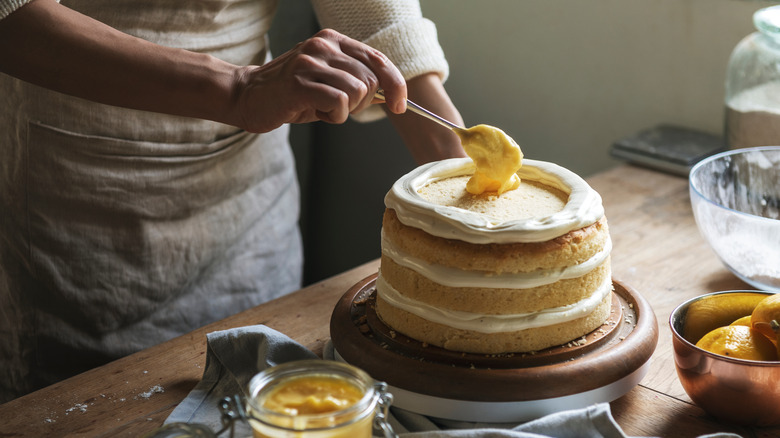Why Making Cake Was So Difficult Before The Invention Of Baking Powder
Author Linda Civitello, whose book Cuisine and Culture: A History of Food and People, is used in culinary schools, describes baking powder as the ultimate shortcut: an ingredient triggering chemical interactions that instantly transform cake batter and dough (per Food Republic). Before baking powder came into existence, potash, an alkaline substance made from ash, was used by exasperated bakers seeking ways to cut down time kneading and stretching dough in the kitchen (via Wise Geek).
English chemist Alfred Bird needed to find an alternative ingredient, records The Nibble, as his allergy-prone wife couldn't tolerate yeast or eggs and still wanted to enjoy cakes with afternoon tea. According to Smithsonian Magazine, by mixing cream of tartar — which was an expensive European product at the time — and baking soda, Bird created what evolved into modern day baking powder. And thankfully so. Without baking powder, making a cake of any kind required serious planning.
Baking powder to the rescue
Before baking powder, cake making wasn't a day-of kind of endeavor. To bake a fluffy, spongy cake, you'd have to allow enough time for yeast to release carbon dioxide into your dough. If you've tried your hand with sourdough, you know that yeast can be a tricky, finicky beast. Yeast needs time to ferment before it can be used in a recipe — we're talking several days — and even then, there is no guarantee the yeast will survive to be uncontaminated and usable (per The Verge).
"You're talking upwards of 12 hours of rising, usually more like 24 hours," National Museum of American History's Food History Project scholar Jessica Carbone told Smithsonian Magazine. Eggs were another option, according to Food Crumbles, but hand-whipping eggs required a different kind of stamina. As you gently scoop a spoon of baking powder into your next recipe, give a silent nod to those 18th century bakers frantically whipping eggs for their cake batter (per What's Cooking America). Tiring, indeed.

